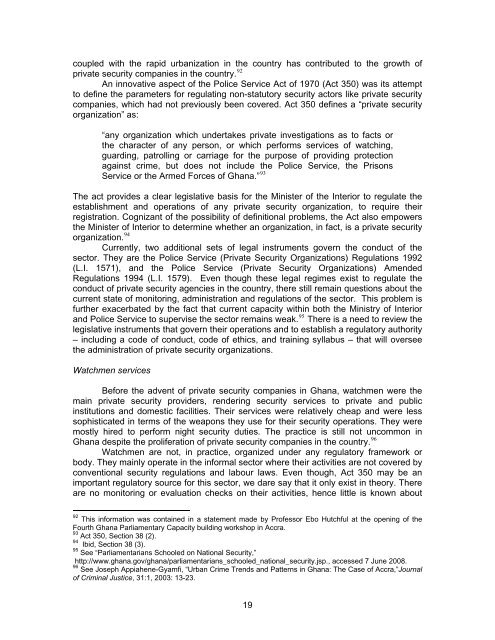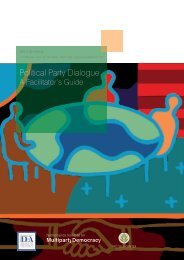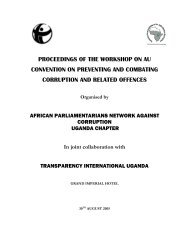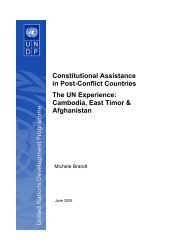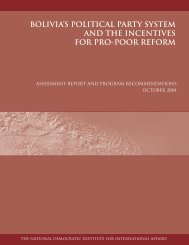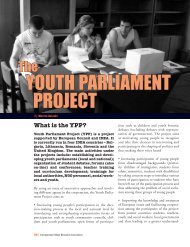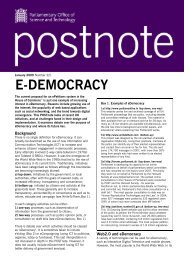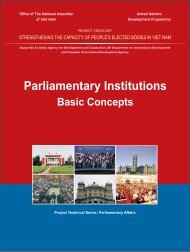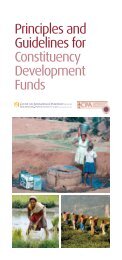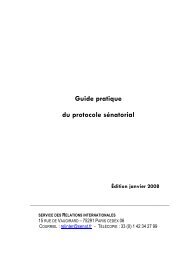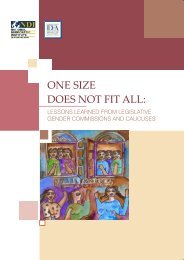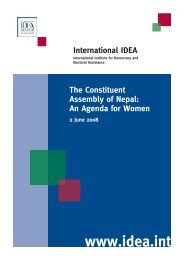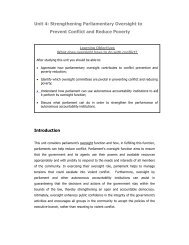Parliamentary Oversight of the Security Sector: Lessons from Ghana
Parliamentary Oversight of the Security Sector: Lessons from Ghana
Parliamentary Oversight of the Security Sector: Lessons from Ghana
You also want an ePaper? Increase the reach of your titles
YUMPU automatically turns print PDFs into web optimized ePapers that Google loves.
coupled with <strong>the</strong> rapid urbanization in <strong>the</strong> country has contributed to <strong>the</strong> growth <strong>of</strong>private security companies in <strong>the</strong> country. 92An innovative aspect <strong>of</strong> <strong>the</strong> Police Service Act <strong>of</strong> 1970 (Act 350) was its attemptto define <strong>the</strong> parameters for regulating non-statutory security actors like private securitycompanies, which had not previously been covered. Act 350 defines a “private securityorganization” as:“any organization which undertakes private investigations as to facts or<strong>the</strong> character <strong>of</strong> any person, or which performs services <strong>of</strong> watching,guarding, patrolling or carriage for <strong>the</strong> purpose <strong>of</strong> providing protectionagainst crime, but does not include <strong>the</strong> Police Service, <strong>the</strong> PrisonsService or <strong>the</strong> Armed Forces <strong>of</strong> <strong>Ghana</strong>.” 93The act provides a clear legislative basis for <strong>the</strong> Minister <strong>of</strong> <strong>the</strong> Interior to regulate <strong>the</strong>establishment and operations <strong>of</strong> any private security organization, to require <strong>the</strong>irregistration. Cognizant <strong>of</strong> <strong>the</strong> possibility <strong>of</strong> definitional problems, <strong>the</strong> Act also empowers<strong>the</strong> Minister <strong>of</strong> Interior to determine whe<strong>the</strong>r an organization, in fact, is a private securityorganization. 94Currently, two additional sets <strong>of</strong> legal instruments govern <strong>the</strong> conduct <strong>of</strong> <strong>the</strong>sector. They are <strong>the</strong> Police Service (Private <strong>Security</strong> Organizations) Regulations 1992(L.I. 1571), and <strong>the</strong> Police Service (Private <strong>Security</strong> Organizations) AmendedRegulations 1994 (L.I. 1579). Even though <strong>the</strong>se legal regimes exist to regulate <strong>the</strong>conduct <strong>of</strong> private security agencies in <strong>the</strong> country, <strong>the</strong>re still remain questions about <strong>the</strong>current state <strong>of</strong> monitoring, administration and regulations <strong>of</strong> <strong>the</strong> sector. This problem isfur<strong>the</strong>r exacerbated by <strong>the</strong> fact that current capacity within both <strong>the</strong> Ministry <strong>of</strong> Interiorand Police Service to supervise <strong>the</strong> sector remains weak. 95 There is a need to review <strong>the</strong>legislative instruments that govern <strong>the</strong>ir operations and to establish a regulatory authority– including a code <strong>of</strong> conduct, code <strong>of</strong> ethics, and training syllabus – that will oversee<strong>the</strong> administration <strong>of</strong> private security organizations.Watchmen servicesBefore <strong>the</strong> advent <strong>of</strong> private security companies in <strong>Ghana</strong>, watchmen were <strong>the</strong>main private security providers, rendering security services to private and publicinstitutions and domestic facilities. Their services were relatively cheap and were lesssophisticated in terms <strong>of</strong> <strong>the</strong> weapons <strong>the</strong>y use for <strong>the</strong>ir security operations. They weremostly hired to perform night security duties. The practice is still not uncommon in<strong>Ghana</strong> despite <strong>the</strong> proliferation <strong>of</strong> private security companies in <strong>the</strong> country. 96Watchmen are not, in practice, organized under any regulatory framework orbody. They mainly operate in <strong>the</strong> informal sector where <strong>the</strong>ir activities are not covered byconventional security regulations and labour laws. Even though, Act 350 may be animportant regulatory source for this sector, we dare say that it only exist in <strong>the</strong>ory. Thereare no monitoring or evaluation checks on <strong>the</strong>ir activities, hence little is known about92 This information was contained in a statement made by Pr<strong>of</strong>essor Ebo Hutchful at <strong>the</strong> opening <strong>of</strong> <strong>the</strong>Fourth <strong>Ghana</strong> <strong>Parliamentary</strong> Capacity building workshop in Accra.93 Act 350, Section 38 (2).94 Ibid, Section 38 (3).95 See “Parliamentarians Schooled on National <strong>Security</strong>,”http://www.ghana.gov/ghana/parliamentarians_schooled_national_security.jsp., accessed 7 June 2008.96 See Joseph Appiahene-Gyamfi, “Urban Crime Trends and Patterns in <strong>Ghana</strong>: The Case <strong>of</strong> Accra,”Journal<strong>of</strong> Criminal Justice, 31:1, 2003: 13-23.19


